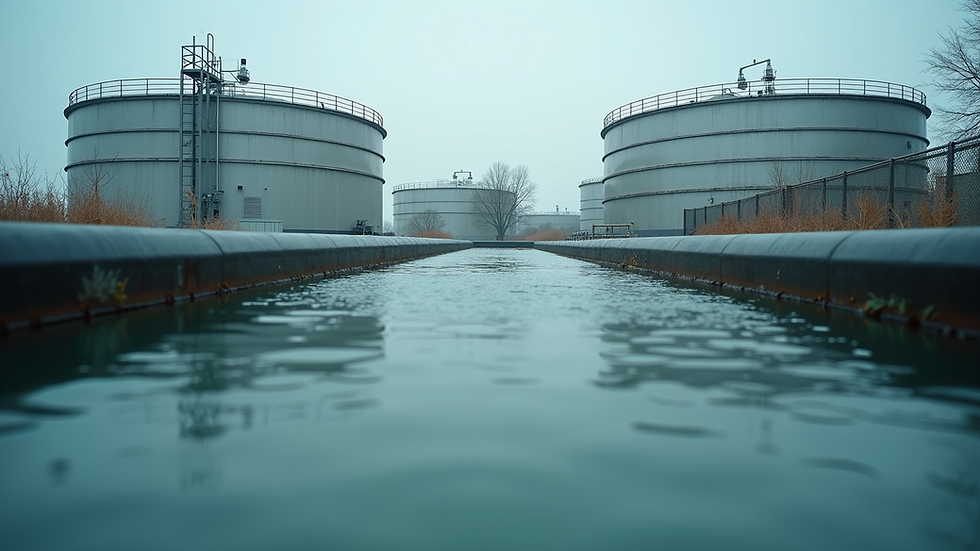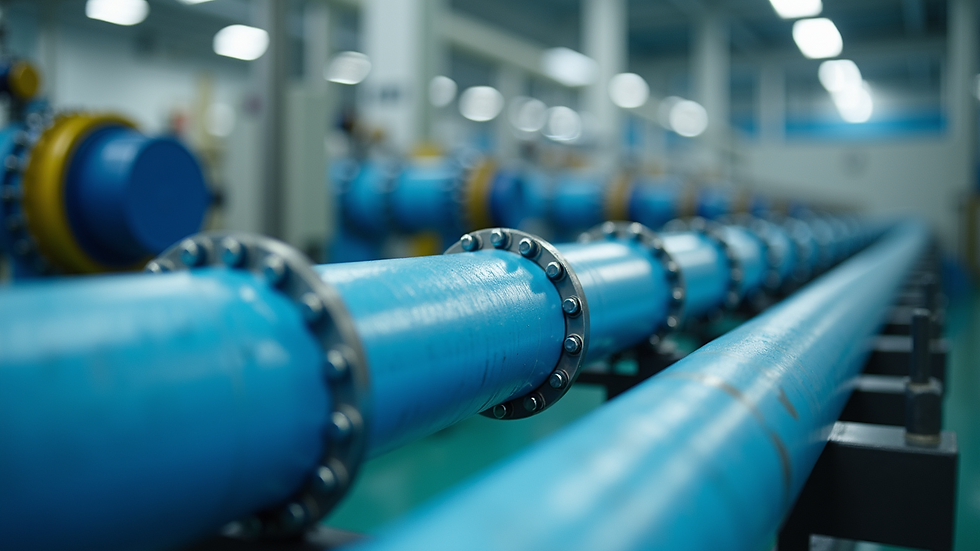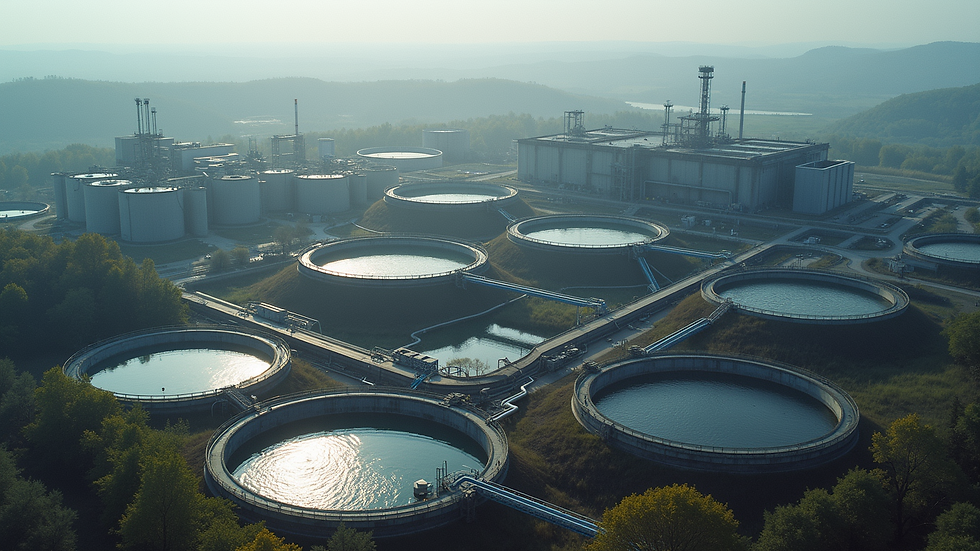Understanding Industrial Wastewater Recycling
- palwinder kaur
- Aug 28, 2025
- 3 min read
Industrial wastewater recycling solutions are becoming increasingly important as industries seek sustainable ways to manage their water resources. Recycling wastewater not only helps reduce environmental pollution but also conserves valuable water, lowers operational costs, and complies with regulatory standards. This article explores the key aspects of industrial wastewater recycling, its benefits, and practical approaches to implementing effective systems.
The Importance of Wastewater Recycling Solutions in Industry
Industries generate large volumes of wastewater containing various contaminants such as chemicals, heavy metals, and organic matter. Discharging untreated wastewater can harm ecosystems, contaminate drinking water sources, and lead to hefty fines. Recycling wastewater offers a practical solution to these challenges by treating and reusing water within industrial processes.
Benefits of wastewater recycling solutions include:
Water conservation: Reduces the demand for fresh water by reusing treated wastewater.
Cost savings: Lowers water procurement and discharge fees.
Environmental protection: Minimizes pollution and protects aquatic life.
Regulatory compliance: Helps meet stringent discharge standards.
Resource recovery: Enables extraction of valuable materials from wastewater.
For example, textile industries often recycle water used in dyeing processes, while power plants reuse cooling water. These practices demonstrate how wastewater recycling solutions can be tailored to specific industrial needs.

Key Technologies in Wastewater Recycling Solutions
Several technologies are employed to treat and recycle industrial wastewater effectively. The choice depends on the type of contaminants, volume of wastewater, and intended reuse application. Common treatment methods include:
Physical Treatment: Removal of suspended solids through sedimentation, filtration, or flotation.
Chemical Treatment: Use of chemicals to neutralize contaminants or precipitate heavy metals.
Biological Treatment: Microorganisms break down organic pollutants in processes like activated sludge or biofilm reactors.
Membrane Filtration: Techniques such as ultrafiltration, nanofiltration, and reverse osmosis remove dissolved solids and pathogens.
Advanced Oxidation Processes: Use of ozone, UV light, or hydrogen peroxide to degrade complex organic compounds.
Combining these methods often results in higher treatment efficiency. For instance, a paper mill might use sedimentation followed by biological treatment and membrane filtration to recycle process water.
Actionable recommendation: Conduct a thorough wastewater characterization to select the most suitable treatment technologies for your facility.

What do you mean by industrial waste management?
Industrial waste management refers to the systematic control of waste materials generated by industrial activities. It involves the collection, treatment, recycling, and disposal of waste to minimize environmental impact and promote sustainability. Industrial waste includes solid waste, hazardous waste, and wastewater.
Effective industrial waste management ensures that hazardous substances do not contaminate soil, water, or air. Recycling wastewater is a critical component of this management, as it reduces the volume of liquid waste and recovers water for reuse.
For example, chemical manufacturing plants implement waste segregation and treatment protocols to handle different waste streams safely. This integrated approach helps industries comply with environmental regulations and supports circular economy principles.
Practical Steps to Implement Industrial Wastewater Recycling
Implementing a successful wastewater recycling system requires careful planning and execution. Here are practical steps industries can follow:
Assess Water Usage and Wastewater Generation: Map out water consumption points and quantify wastewater volumes.
Analyze Wastewater Composition: Identify contaminants and their concentrations to determine treatment needs.
Set Recycling Goals: Define the quality and quantity of recycled water required for reuse.
Design Treatment System: Choose appropriate technologies based on wastewater characteristics and reuse applications.
Install Monitoring and Control Systems: Ensure continuous performance tracking and compliance.
Train Staff: Educate employees on operation, maintenance, and safety procedures.
Evaluate and Optimize: Regularly review system performance and make improvements.
Example: A food processing plant might recycle wash water by installing a combination of filtration and UV disinfection to meet hygiene standards for equipment cleaning.

The Role of Industrial Wastewater Management in Sustainability
Integrating industrial wastewater management into business operations is essential for sustainable industrial growth. It helps industries reduce their environmental footprint while improving resource efficiency. By adopting wastewater recycling solutions, companies can:
Enhance corporate social responsibility credentials.
Reduce dependency on freshwater sources.
Lower operational risks related to water scarcity.
Support local communities by protecting water quality.
Governments and regulatory bodies worldwide are encouraging industries to adopt such practices through incentives and stricter regulations. Embracing these changes not only ensures compliance but also positions businesses as leaders in environmental stewardship.
Moving Forward with Wastewater Recycling Solutions
Industrial wastewater recycling solutions are no longer optional but a necessity for modern industries. By understanding the technologies, benefits, and implementation strategies, industries can make informed decisions that promote sustainability and operational efficiency.
Investing in advanced treatment systems and adopting best practices in wastewater recycling will yield long-term economic and environmental benefits. As water scarcity becomes a global concern, industries that prioritize wastewater recycling will be better equipped to face future challenges.
Start by evaluating your current wastewater management practices and explore innovative recycling solutions tailored to your industry’s needs. This proactive approach will contribute to a cleaner environment and a more sustainable industrial future.



Comments